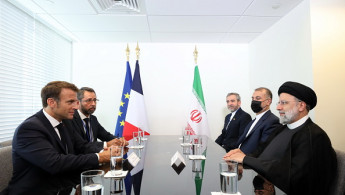Presidents Raisi, Macron discuss promoting Iran-France ties
Iranian President Ebrahim Raisi and his French counterpart Emmanuel Macron discussed ways for the two countries to strengthen ties in a phone call on Saturday.
Mohamed Jamshidi, Raisi’s deputy chief of staff, tweeted that Macron “wants engagement with the Islamic Republic of Iran” and the two presidents “discussed how to promote relations” especially “about ongoing negotiations [and] regional development.
According to Jamshidi, the presidents “agreed about a roadmap for engagement” in the 90-minute-long call, referring to the diplomatic limbo within which the Iranian nuclear deal currently resides.
French President Macron called Dr Raisi today & they spoke for 90 min. Macron stressed he wants engagement with Islamic Republic of Iran. The 2 sides discussed how to promote relations esp about ongoing negotiations & regional developments. They agreed on a roadmap for engagement
— Mohammad Jamshidi (@MhmmdJamshidi) June 10, 2023
The 2015 deal between Iran and major global powers gave the Iranian regime relief from international sanctions in return for several restrictions on its nuclear programme.
But in 2018, under then President Donald Trump, the US unilaterally withdrew from the deal and reimposed sanctions, which then led to Iran lifting the restrictions agreed in the nuclear deal.
It was thought that Joe Biden might prioritise reviving the deal, but Iran has faced a severe backlash for its brutal crushing of protests against the country’s mandatory hijab law.
Macron’s willingness now to engage directly with Raisi could be interpreted as a sign of a growing inclination for the US and the West in general to get the nuclear deal back on track.
Iran is currently negotiating a normalisation of diplomacy with Saudi Arabia brokered by China.
The US and West could see the revival of the deal as a counter to the perception of China moving to fill the apparent void of US power in the region.
In addition to this, Israel has warned that it could use military force against Iranian nuclear facilities, something that the US would want to avoid for the sake of regional stability and the potential harm it could bring to US personnel in Syria and Iraq.
France might also see rapprochement with Iran as key to breaking the political deadlock in Lebanon, for which it recently appointed an envoy to help mediate between.
The Hezbollah-led coalition, which is backed by Iran, continues to collapse the presidential election process by staging walkouts during second-round votes in the parliament.
Macron might see any attempts to mediate in Lebanon without Iranian approval or participation as a non-starter.





 Follow the Middle East's top stories in English at The New Arab on Google News
Follow the Middle East's top stories in English at The New Arab on Google News


